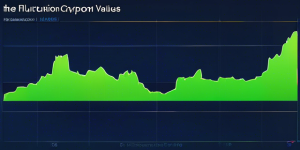
In the ever-evolving digital landscape, the rise of cryptocurrencies has been nothing short of a seismic shift. These decentralized, borderless virtual currencies have disrupted traditional financial systems, captivating investors and revolutionizing the way we perceive value exchange. However, as with any disruptive innovation, the realm of cryptocurrency regulation has become a intricate tapestry of debates, challenges, and potential opportunities.
Evolution of Cryptocurrency: From Obscurity to Mainstream
Cast your mind back to 2008, when an enigmatic figure known as Satoshi Nakamoto unleashed the groundbreaking concept of Bitcoin upon the world. Initially dismissed as a novelty by many, Bitcoin and its underlying blockchain technology quickly gained traction among tech enthusiasts and libertarians alike. Fast forward to the present day, and cryptocurrencies have metamorphosed into a multi-billion dollar industry, attracting the attention of investors, financial institutions, and governments worldwide.
The Regulatory Conundrum
As cryptocurrencies transcended their niche beginnings and infiltrated the mainstream, regulators found themselves grappling with a unique challenge. How do you effectively regulate a decentralized, global phenomenon that defies traditional financial boundaries? This question has sparked heated debates and exposed the inherent tensions between innovation and regulatory oversight.
Navigating the Regulatory Landscape
The regulatory landscape for cryptocurrencies is a patchwork quilt of varying approaches and interpretations. Some countries have embraced cryptocurrencies with open arms, recognizing their potential for economic growth and innovation. Others have adopted a more cautious stance, implementing strict regulations or outright bans to mitigate perceived risks such as money laundering, tax evasion, and financial instability.
The United States: A Balancing Act
In the United States, the regulatory framework for cryptocurrencies is a complex tapestry woven by various agencies and government bodies. The Securities and Exchange Commission (SEC) has taken a proactive stance, classifying certain cryptocurrencies as securities and subjecting them to securities laws. The Commodity Futures Trading Commission (CFTC), on the other hand, has recognized cryptocurrencies as commodities, bringing them under its purview.
The Financial Crimes Enforcement Network (FinCEN) and the Internal Revenue Service (IRS) have also played pivotal roles in regulating cryptocurrencies, with a focus on anti-money laundering measures and tax compliance, respectively. This multi-agency approach has aimed to strike a balance between fostering innovation and mitigating potential risks.
The European Union: Harmonizing Regulations
Across the Atlantic, the European Union (EU) has been steadily working towards harmonizing cryptocurrency regulations across its member states. The Fifth Anti-Money Laundering Directive (5AMLD) marked a significant step in this direction, bringing virtual asset service providers (VASPs) under the umbrella of anti-money laundering and counter-terrorist financing regulations.
Furthermore, the EU has proposed the Markets in Crypto-Assets (MiCA) regulation, a comprehensive framework aimed at fostering innovation while protecting consumers and maintaining financial stability.
Asia: A Diverse Regulatory Landscape
Asia, home to some of the world’s largest cryptocurrency markets, presents a diverse tapestry of regulatory approaches. Countries like Singapore and Japan have embraced cryptocurrencies, implementing robust regulatory frameworks to promote innovation while mitigating risks. On the other hand, China has taken a more hardline stance, issuing outright bans on cryptocurrency trading and mining activities.
The Challenges of Cryptocurrency Regulation

Regulating cryptocurrencies is no easy feat, as it presents a unique set of challenges that transcend traditional financial boundaries.
Decentralization and Anonymity
One of the core tenets of cryptocurrencies is their decentralized nature, which means there is no central authority or intermediary governing transactions. This presents a significant challenge for regulators, as traditional financial oversight mechanisms become less effective in a decentralized ecosystem. Additionally, the anonymity afforded by many cryptocurrencies can potentially facilitate illicit activities, further complicating regulatory efforts.
Technological Complexity
The underlying blockchain technology that powers cryptocurrencies is inherently complex, requiring a deep understanding of cryptography, distributed ledgers, and consensus mechanisms. Regulators must grapple with this technological complexity, often facing a steep learning curve, to effectively regulate and oversee the cryptocurrency ecosystem.
Global Reach and Jurisdictional Challenges
Cryptocurrencies are truly borderless, transcending national boundaries with ease. This global reach presents significant jurisdictional challenges for regulators, as a single cryptocurrency transaction can involve multiple countries with varying regulatory frameworks. Coordinating and harmonizing regulations across jurisdictions is a herculean task, further compounded by the rapidly evolving nature of the cryptocurrency landscape.
The Pursuit of Balance: Innovation vs. Risk Mitigation
At the crux of the cryptocurrency regulation debate lies a delicate balancing act: fostering innovation while mitigating potential risks. Proponents of cryptocurrencies argue that excessive regulation could stifle innovation and hinder the development of groundbreaking technologies. Conversely, regulators and traditional financial institutions emphasize the need for robust oversight to protect consumers, maintain financial stability, and prevent illicit activities.
Embracing a Balanced Approach
Finding the sweet spot between these contrasting perspectives is the ultimate goal of effective cryptocurrency regulation. A balanced approach should aim to create a regulatory framework that promotes innovation while providing clear guidelines, consumer protection measures, and safeguards against potential risks.
Regulatory Sandboxes and Experimentation Zones
One potential solution that has gained traction is the establishment of regulatory sandboxes and experimentation zones. These controlled environments allow businesses and innovators to test and develop their cryptocurrency-related products and services within a well-defined regulatory framework, fostering innovation while mitigating risks.
By closely monitoring and evaluating these experimental initiatives, regulators can gain valuable insights and adapt their regulatory approaches accordingly, striking a balance between nurturing innovation and maintaining oversight.
The Role of Self-Regulation and Industry Collaboration
While government regulation plays a crucial role in shaping the cryptocurrency landscape, the industry itself has a significant part to play in promoting responsible practices and self-regulation.
Industry-Led Initiatives
Organizations like the Cryptocurrency Compliance Cooperative (CryptoCoCo), the Blockchain Alliance, and the Global Digital Finance (GDF) have emerged as catalysts for self-regulation within the cryptocurrency industry. These initiatives bring together industry leaders, experts, and stakeholders to develop best practices, guidelines, and standards for responsible cryptocurrency use and governance.
By fostering collaboration and industry-wide cooperation, these organizations aim to promote transparency, accountability, and ethical conduct, ultimately strengthening the credibility and legitimacy of the cryptocurrency ecosystem.
Public-Private Partnerships
Effective regulation of cryptocurrencies requires a collaborative effort between government agencies and industry stakeholders. Public-private partnerships can facilitate knowledge sharing, foster mutual understanding, and enable the development of tailored regulatory frameworks that address the unique challenges of the cryptocurrency landscape.
By leveraging the expertise and insights of both regulatory bodies and industry leaders, these partnerships can navigate the complexities of cryptocurrency regulation, striking a balance between innovation and risk mitigation.
The Future of Cryptocurrency Regulation
As the cryptocurrency landscape continues to evolve at a breakneck pace, the future of regulation remains a captivating and ever-changing narrative.
Emerging Trends and Disruptive Technologies
The advent of decentralized finance (DeFi), non-fungible tokens (NFTs), and other blockchain-based innovations will undoubtedly pose new regulatory challenges. Regulators must remain agile and adaptable, continuously assessing and updating their frameworks to keep pace with these emerging trends and disruptive technologies.
International Cooperation and Harmonization
Given the global nature of cryptocurrencies, international cooperation and harmonization of regulations will become increasingly crucial. Collaborative efforts among nations and supranational organizations will be essential in establishing consistent standards, preventing regulatory arbitrage, and fostering a level playing field for businesses and investors.
Regulatory Tokenization and DeFi Oversight
As the cryptocurrency ecosystem expands into the realms of tokenization and decentralized finance (DeFi), regulators will need to develop innovative approaches to address these emerging paradigms. Tokenization of traditional assets and the proliferation of DeFi protocols raise questions about asset classification, investor protection, and systemic risk mitigation.
Sustainable and Ethical Considerations
The regulatory discourse surrounding cryptocurrencies must also encompass broader societal concerns, such as environmental
sustainability and ethical considerations. The energy-intensive nature of certain cryptocurrency mining processes has sparked debates about their environmental impact, prompting calls for more sustainable practices and the adoption of renewable energy sources.
Furthermore, as cryptocurrencies gain mainstream adoption, issues related to financial inclusion, consumer protection, and responsible investment practices must be addressed through robust regulatory frameworks.
Conclusion
The world of cryptocurrency regulation is a complex tapestry woven with innovation, risk mitigation, and the pursuit of balance. As this digital phenomenon continues to disrupt traditional financial systems, regulators must navigate uncharted waters, adapting and evolving their approaches to keep pace with the ever-changing landscape.
Effective regulation requires a delicate balance between fostering innovation and mitigating potential risks, embracing collaboration between government agencies, industry stakeholders, and international bodies. By striking this balance, the cryptocurrency ecosystem can realize its full potential, revolutionizing finance while maintaining a robust framework that promotes transparency, accountability, and consumer protection.
As we look to the future, the regulatory landscape for cryptocurrencies will undoubtedly evolve, shaped by emerging trends, disruptive technologies, and the collective wisdom of stakeholders worldwide. Embracing a spirit of agility, collaboration, and ethical responsibility will be key to navigating this uncharted territory, unlocking the transformative potential of cryptocurrencies while ensuring a sustainable and equitable financial future for all.
FAQs: The Enigmatic World of Cryptocurrency Regulation 2024
- What are some of the key challenges in regulating cryptocurrencies? Regulating cryptocurrencies presents unique challenges, including their decentralized and anonymous nature, technological complexity, global reach, and jurisdictional challenges across different regulatory frameworks.
- How are governments and regulatory bodies approaching cryptocurrency regulation? Governments and regulatory bodies have adopted varying approaches, ranging from embracing cryptocurrencies with robust regulatory frameworks to implementing strict regulations or outright bans. Many are working towards harmonizing regulations, fostering innovation while mitigating risks.
- What role does industry self-regulation play in the cryptocurrency landscape? Industry-led initiatives, such as the Cryptocurrency Compliance Cooperative (CryptoCoCo), the Blockchain Alliance, and the Global Digital Finance (GDF), play a crucial role in promoting self-regulation, developing best practices, and fostering responsible practices within the cryptocurrency industry.
- How can a balance between innovation and risk mitigation be achieved in cryptocurrency regulation? Achieving a balance requires a collaborative effort between government agencies, industry stakeholders, and international bodies. Regulatory sandboxes, experimentation zones, and public-private partnerships can facilitate innovation while maintaining oversight and risk mitigation measures.
- What are some emerging trends and disruptive technologies that may impact future cryptocurrency regulation? Emerging trends like decentralized finance (DeFi), non-fungible tokens (NFTs), tokenization of traditional assets, and blockchain-based innovations will pose new regulatory challenges. Regulators must remain agile and adaptable, continuously updating their frameworks to address these evolving paradigms.